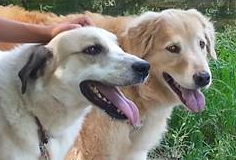Why We Have Dogs: The evolutionary origins of our four-footed friends
We love our dogs. They’ve got soft fur, floppy ears, cute eyes, and sometimes spots. And curly tails. They cuddle. They fetch. They play. And they arguably represent an important part of the human evolutionary story.
If you want to understand why your dog does what it does today, it’ll help you to understand the evolutionary history of domesticated dogs. One critical piece of the story is this: Dogs were domesticated some time between 20,000 and 40,000 years ago in parts of Europe, the Middle East, and Asia (see Skoglund, Ersmark, Palkopoulou, & Dalén, 2015). From the perspective of human evolution, this fact is important because this means that humans and dogs formed symbiotic relationships while all humans on the planet were still nomadic hunters and gatherers. Thus, our relationships with dogs started well before agriculture and civilization came onto the scene.
The fact that dogs and humans had symbiotic relationships for thousands of years prior to agriculture has several implications to help us understand why dogs are so central to the lives of so many today. In short, this fact implies that many features of dogs were not shaped to match modern environments but, rather, they were selected (by a combination of artificial and natural selection) to match human nomadic conditions.
Based on genetic and fossil evidence, it looks like proto-dogs were relatively tame gray wolves that benefited from scavenging the remains from human hunts. So food is what the first dogs got out of the bargain. But what did our nomadic human ancestors get out of the deal? How did our ancestors benefit from forming alliances with dogs?
The Evolution of the Watchdog
Research into the origins of domesticated dogs suggests that dogs provided several functions for early humans (such as help with hunting large game). One function that pertains directly to my current life — and that may relate to your life also — pertains to the role of the watchdog.
Imagine this: You and your clan are currently camping out in a jungle area in Asia. There is some good game in the area and you all tend to spend a few weeks in this area each year before moving onto a different locale when the seasons change. While you have fire at night, there are some scary things there in the woods. Tigers and snakes are among them. You’ve had several members of the clan die of snake bites in the past few years, and you’re not too keen on being the next on that list.
Good thing for the five loyal dogs that you’ve got who are a regular part of the clan. They’ve got some bark — and when they coordinate and bark in symphony, they are a force.
Further, your pack of dogs acts like a highly sensitive fire alarm, and their hearing and sense of smell are way better than your own. And they are vigilant! A little rustle in the trees at night? Woof Woof Woof! A snake slithering in the grass? Woof! Woof! Woof! A stranger from another band sneaking into the encampment at night? Snarl! Woof! Snarl! Snarl! And once one of them senses something, you know how it goes: all five of them are on it — barking full-throttle — protecting you and your clan from any and all threats that might be out there.
Did ancient humans benefit from having a pack of watchdogs? You bet they did.
Further, think about the characteristics of a good watchdog. If there are real threats out there, do you want your watchdog to be hyper-vigilant? Heck yes. You do. If you’re in the jungles of Asia and there are tigers and snakes by the hundreds hiding in the woods, you want your dogs to bark any time the wind blows.

Source: Glenn Geher
Fast forward to the present day. Our family has two dogs — Cujo and Nico. We love them like family. They are furry and fun. But wow do they bark! The mailman comes — they bark. The neighbors across the street pull into their driveway — they bark. The garbage truck comes — Woof Woof! The kids from down the street come to see if our kids are home — Woof Woof Woof! The dogs down the street bark at 3 a.m. — Nico and Cuju join the chorus. Ad infinitum.
Yeah, I hate to say it, but it can be a little annoying. But you know, we’re not getting anti-bark collars any time soon. Nico and Cujo are just doing their job. One of the main reasons we have these wonderful critters in our lives today pertains to the fact that modern dogs are descendants of great watchdogs — watchdogs that played a critical role in the survival of our ancestors.
Remember, the qualities of domesticated dogs evolved not for humans in modern conditions, but for humans in ancestral, nomadic conditions. So next time that Fido goes nuts when your friends come to the door — or wakes everyone up in the middle of the night because a skunk is in the front yard, or scares away the delivery guy who has that thing from L.L. Bean that you were really hoping to get today — make sure to thank Fido for doing such a great job of carrying out his evolved function. And feel free to give him a bone!
Why We Have Dogs: The evolutionary origins of our four-footed friends
![Why We Have Dogs: The evolutionary origins of our four-footed friends]() Reviewed by Unknown
on
10:19
Rating:
Reviewed by Unknown
on
10:19
Rating:







No comments: